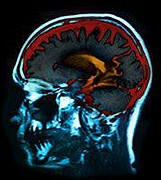High-Dose Chemo Helps Beat Rare Brain Cancer
Many patients achieved long-term remission without radiation, study finds.
By Steven Reinberg
HealthDay Reporter
|
E-mail this article
Subscribe to news
Printer friendly version
|

(SOURCES: Tracy Batchelor, M.D., associate professor, neurology, Harvard University, and executive director, Stephen E. & Catherine Pappas Center for Neuro-Oncology, Massachusetts General Hospital Cancer Center, both in Boston; Paul Graham Fisher, M.D. associate professor, neurology, and the Beirne Family Director of Neuro-Oncology, Packard Hospital, Stanford University, Palo Alto, Calif.; Jan. 29, 2008, Neurology)
WEDNESDAY, Jan. 30 (HealthDay News) -- Most people suffering from a rare brain cancer appear to benefit from high doses of the chemotherapy drug methotrexate, a small study finds.
Primary central nervous system lymphoma (PCNSL) is a type of non-Hodgkin lymphoma that affects the brain. Although it is typically very difficult to treat, it can be cured or sent into long remissions. Current treatment is often a combination of radiation and chemotherapy. Newer approaches involve giving chemotherapy first, and waiting on radiation until the results of chemotherapy are seen.
However, "A subset of these patients with a rare form of non-Hodgkin lymphoma appeared to be cured by chemotherapy alone," explained lead researcher Dr. Tracy Batchelor, from the Massachusetts General Hospital Cancer Center in Boston.
Batchelor, who is executive director of the Stephen E. & Catherine Pappas Center for Neuro-Oncology at the hospital, noted there are about 1,500 new cases of PCNSL diagnosed in the United States each year.
In the study, Batchelor's group treated 25 adults with newly diagnosed PCNSL with a high dose of methotrexate every two weeks for four months, or until there were no signs of the brain tumor. The patients were followed for a minimum of 6.5 years.
The report appears in the Jan. 29 issue of Neurology.
Batchelor's team found that 52 percent of the patients had a complete remission of their cancer and 40 percent had not had a relapse after seven years. Average survival of all patients who received methotrexate was 4.5 years, compared with one year among patients who had radiation therapy.
It's clear that methotrexate is the best drug to treat this tumor, Batchelor said. "The drug attacks cells that are dividing. Other drugs don't have as high a response rate," he explained.
Batchelor noted that it is unusual for a single drug to achieve remission in cancer.
More studies are needed to find the most effective dose of methotrexate and to find a combination therapy that will produce even better results, Batchelor said. "The question is whether adding other drugs will make patients do better," he said.
"We are looking for drugs that act against lymphoma and actually get into the nervous system," Batchelor said. "We have a new trial where we will be adding three additional drugs to methotrexate. We hope we are going to see even more patients achieve long-term remission."
One expert believes that, based on these findings, methotrexate could save many patients from having to undergo harmful brain radiation.
"Methotrexate is to date the most effective reported drug in primary central nervous system lymphoma," said Dr. Paul Graham Fisher, an associate professor of neurology and the Beirne Family Director of Neuro-Oncology at Packard Hospital at Stanford University.
This is encouraging because in some rare instances patients may not need radiation treatment, Fisher said. "As a cautionary note, the numbers of patients are small, and we need to see greater extension of this work, and also with monitoring patients for leukoencephalopathy (destruction of fibers covering nerve cells), apparently seen more widely when used in children with leukemia," he said.
Methotrexate is commonly used in chemotherapy and is also used in treating autoimmune diseases such as Crohn's disease, psoriasis and arthritis.
More information
For more on primary central nervous system lymphoma, visit the U.S. National Cancer Institute.
Copyright © 2008 ScoutNews, LLC. All rights reserved. 
HealthDayNews articles are derived from various sources and do not reflect federal policy. healthfinder.gov does not endorse opinions, products, or services that may appear in news stories. For more information on health topics in the news, visit the healthfinder.gov health library.